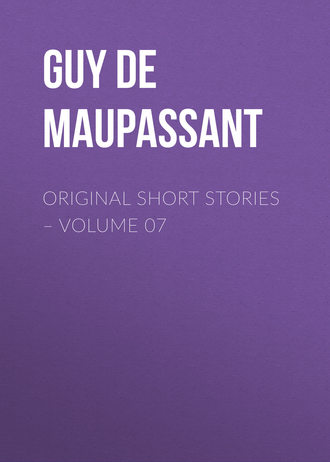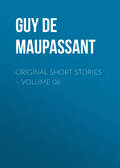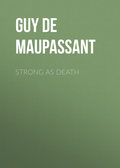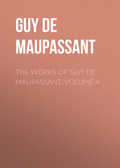
Ги де Мопассан
Original Short Stories – Volume 07
A NEW YEAR’S GIFT
Jacques de Randal, having dined at home alone, told his valet he might go out, and he sat down at his table to write some letters.
He ended every year in this manner, writing and dreaming. He reviewed the events of his life since last New Year’s Day, things that were now all over and dead; and, in proportion as the faces of his friends rose up before his eyes, he wrote them a few lines, a cordial New Year’s greeting on the first of January.
So he sat down, opened a drawer, took out of it a woman’s photograph, gazed at it a few moments, and kissed it. Then, having laid it beside a sheet of notepaper, he began:
“MY DEAR IRENE: You must by this time have received the little souvenir I sent, you addressed to the maid. I have shut myself up this evening in order to tell you – ”
The pen here ceased to move. Jacques rose up and began walking up and down the room.
For the last ten months he had had a sweetheart, not like the others, a woman with whom one engages in a passing intrigue, of the theatrical world or the demi-monde, but a woman whom he loved and won. He was no longer a young man, although he was still comparatively young for a man, and he looked on life seriously in a positive and practical spirit.
Accordingly, he drew up the balance sheet of his passion, as he drew up every year the balance sheet of friendships that were ended or freshly contracted, of circumstances and persons that had entered into his life.
His first ardor of love having grown calmer, he asked himself with the precision of a merchant making a calculation what was the state of his heart with regard to her, and he tried to form an idea of what it would be in the future.
He found there a great and deep affection; made up of tenderness, gratitude and the thousand subtleties which give birth to long and powerful attachments.
A ring at the bell made him start. He hesitated. Should he open the door? But he said to himself that one must always open the door on New Year’s night, to admit the unknown who is passing by and knocks, no matter who it may be.
So he took a wax candle, passed through the antechamber, drew back the bolts, turned the key, pulled the door back, and saw his sweetheart standing pale as a corpse, leaning against the wall.
He stammered:
“What is the matter with you?”
She replied:
“Are you alone?”
“Yes.”
“Without servants?”
“Yes.”
“You are not going out?”
“No.”
She entered with the air of a woman who knew the house. As soon as she was in the drawing-room, she sank down on the sofa, and, covering her face with her hands, began to weep bitterly.
He knelt down at her feet, and tried to remove her hands from her eyes, so that he might look at them, and exclaimed:
“Irene, Irene, what is the matter with you? I implore you to tell me what is the matter with you?”
Then, amid her sobs, she murmured:
“I can no longer live like this.”
“Live like this? What do you mean?”
“Yes. I can no longer live like this. I have endured so much. He struck me this afternoon.”
“Who? Your husband?”
“Yes, my husband.”
“Ah!”
He was astonished, having never suspected that her husband could be brutal. He was a man of the world, of the better class, a clubman, a lover of horses, a theatergoer and an expert swordsman; he was known, talked about, appreciated everywhere, having very courteous manners, a very mediocre intellect, an absence of education and of the real culture needed in order to think like all well-bred people, and finally a respect for conventionalities.
He appeared to devote himself to his wife, as a man ought to do in the case of wealthy and well-bred people. He displayed enough of anxiety about her wishes, her health, her dresses, and, beyond that, left her perfectly free.
Randal, having become Irene’s friend, had a right to the affectionate hand-clasp which every husband endowed with good manners owes to his wife’s intimate acquaintance. Then, when Jacques, after having been for some time the friend, became the lover, his relations with the husband were more cordial, as is fitting.
Jacques had never dreamed that there were storms in this household, and he was bewildered at this unexpected revelation.
He asked:
“How did it happen? Tell me.”
Thereupon she related a long story, the entire history of her life since the day of her marriage, the first disagreement arising out of a mere nothing, then becoming accentuated at every new difference of opinion between two dissimilar dispositions.
Then came quarrels, a complete separation, not apparent, but real; next, her husband showed himself aggressive, suspicious, violent. Now, he was jealous, jealous of Jacques, and that very day, after a scene, he had struck her.
She added with decision: “I will not go back to him. Do with me what you like.”
Jacques sat down opposite to her, their knees touching. He took her hands:
“My dear love, you are going to commit a gross, an irreparable folly. If you want to leave your husband, put him in the wrong, so that your position as a woman of the world may be saved.”
She asked, as she looked at him uneasily:
“Then, what do you advise me?”
“To go back home and to put up with your life there till the day when you can obtain either a separation or a divorce, with the honors of war.”
“Is not this thing which you advise me to do a little cowardly?”
“No; it is wise and sensible. You have a high position, a reputation to protect, friends to preserve and relations to deal with. You must not lose all these through a mere caprice.”
She rose up, and said with violence:
“Well, no! I cannot stand it any longer! It is at an end! it is at an end!”
Then, placing her two hands on her lover’s shoulders, and looking him straight in the face, she asked:
“Do you love me?”
“Yes.”
“Really and truly?”
“Yes.”
“Then take care of me.”
He exclaimed:
“Take care of you? In my own house? Here? Why, you are mad. It would mean losing you forever; losing you beyond hope of recall! You are mad!”
She replied, slowly and seriously, like a woman who feels the weight of her words:
“Listen, Jacques. He has forbidden me to see you again, and I will not play this comedy of coming secretly to your house. You must either lose me or take me.”
“My dear Irene, in that case, obtain your divorce, and I will marry you.”
“Yes, you will marry me in – two years at the soonest. Yours is a patient love.”
“Look here! Reflect! If you remain here he’ll come to-morrow to take you away, seeing that he is your husband, seeing that he has right and law on his side.”
“I did not ask you to keep me in your own house, Jacques, but to take me anywhere you like. I thought you loved me enough to do that. I have made a mistake. Good-by!”
She turned round and went toward the door so quickly that he was only able to catch hold of her when she was outside the room:
“Listen, Irene.”
She struggled, and would not listen to him. Her eyes were full of tears, and she stammered:
“Let me alone! let me alone! let me alone!”
He made her sit down by force, and once more falling on his knees at her feet, he now brought forward a number of arguments and counsels to make her understand the folly and terrible risk of her project. He omitted nothing which he deemed necessary to convince her, finding even in his very affection for her incentives to persuasion.
As she remained silent and cold as ice, he begged of her, implored of her to listen to him, to trust him, to follow his advice.
When he had finished speaking, she only replied:
“Are you disposed to let me go away now? Take away your hands, so that I may rise to my feet.”
“Look here, Irene.”
“Will you let me go?”
“Irene – is your resolution irrevocable?”
“Will you let me go.”
“Tell me only whether this resolution, this mad resolution of yours, which you will bitterly regret, is irrevocable?”
“Yes – let me go!”
“Then stay. You know well that you are at home here. We shall go away to-morrow morning.”
She rose to her feet in spite of him, and said in a hard tone:
“No. It is too late. I do not want sacrifice; I do not want devotion.”
“Stay! I have done what I ought to do; I have said what I ought to say. I have no further responsibility on your behalf. My conscience is at peace. Tell me what you want me to do, and I will obey.”’
She resumed her seat, looked at him for a long time, and then asked, in a very calm voice:
“Well, then, explain.”
“Explain what? What do you wish me to explain?”
“Everything – everything that you thought about before changing your mind. Then I will see what I ought to do.”
“But I thought about nothing at all. I had to warn you that you were going to commit an act of folly. You persist; then I ask to share in this act of folly, and I even insist on it.”
“It is not natural to change one’s mind so quickly.”
“Listen, my dear love. It is not a question here of sacrifice or devotion. On the day when I realized that I loved you, I said to myself what every lover ought to say to himself in the same case: ‘The man who loves a woman, who makes an effort to win her, who gets her, and who takes her, enters into a sacred contract with himself and with her. That is, of course, in dealing with a woman like you, not a woman with a fickle heart and easily impressed.’
“Marriage which has a great social value, a great legal value, possesses in my eyes only a very slight moral value, taking into account the conditions under which it generally takes place.
“Therefore, when a woman, united by this lawful bond, but having no attachment to her husband, whom she cannot love, a woman whose heart is free, meets a man whom she cares for, and gives herself to him, when a man who has no other tie, takes a woman in this way, I say that they pledge themselves toward each other by this mutual and free agreement much more than by the ‘Yes’ uttered in the presence of the mayor.
“I say that, if they are both honorable persons, their union must be more intimate, more real, more wholesome, than if all the sacraments had consecrated it.
“This woman risks everything. And it is exactly because she knows it, because she gives everything, her heart, her body, her soul, her honor, her life, because she has foreseen all miseries, all dangers all catastrophes, because she dares to do a bold act, an intrepid act, because she is prepared, determined to brave everything – her husband, who might kill her, and society, which may cast her out. This is why she is worthy of respect in the midst of her conjugal infidelity; this is why her lover, in taking her, should also foresee everything, and prefer her to every one else whatever may happen. I have nothing more to say. I spoke in the beginning like a sensible man whose duty it was to warn you; and now I am only a man – a man who loves you – Command, and I obey.”
Radiant, she closed his mouth with a kiss, and said in a low tone:
“It is not true, darling! There is nothing the matter! My husband does not suspect anything. But I wanted to see, I wanted to know, what you would do I wished for a New Year’s gift – the gift of your heart – another gift besides the necklace you sent me. You have given it to me. Thanks! thanks! God be thanked for the happiness you have given me!”
FRIEND PATIENCE
“What became of Leremy?”
“He is captain in the Sixth Dragoons.”
“And Pinson?”
“He’s a subprefect.”
“And Racollet?”
“Dead.”
We were searching for other names which would remind us of the youthful faces of our younger days. Once in a while we had met some of these old comrades, bearded, bald, married, fathers of several children, and the realization of these changes had given us an unpleasant shudder, reminding us how short life is, how everything passes away, how everything changes. My friend asked me:
“And Patience, fat Patience?”
I almost, howled:
“Oh! as for him, just listen to this. Four or five years ago I was in Limoges, on a tour of inspection, and I was waiting for dinner time. I was seated before the big cafe in the Place du Theatre, just bored to death. The tradespeople were coming by twos, threes or fours, to take their absinthe or vermouth, talking all the time of their own or other people’s business, laughing loudly, or lowering their voices in order to impart some important or delicate piece of news.
“I was saying to myself: ‘What shall I do after dinner?’ And I thought of the long evening in this provincial town, of the slow, dreary walk through unknown streets, of the impression of deadly gloom which these provincial people produce on the lonely traveller, and of the whole oppressive atmosphere of the place.
“I was thinking of all these things as I watched the little jets of gas flare up, feeling my loneliness increase with the falling shadows.
“A big, fat man sat down at the next table and called in a stentorian voice:
“‘Waiter, my bitters!’
“The ‘my’ came out like the report of a cannon. I immediately understood that everything was his in life, and not another’s; that he had his nature, by Jove, his appetite, his trousers, his everything, his, more absolutely and more completely than anyone else’s. Then he looked round him with a satisfied air. His bitters were brought, and he ordered:
“‘My newspaper!’
“I wondered: ‘Which newspaper can his be?’ The title would certainly reveal to me his opinions, his theories, his principles, his hobbies, his weaknesses.
“The waiter brought the Temps. I was surprised. Why the Temps, a serious, sombre, doctrinaire, impartial sheet? I thought:
“‘He must be a serious man with settled and regular habits; in short, a good bourgeois.’
“He put on his gold-rimmed spectacles, leaned back before beginning to read, and once more glanced about him. He noticed me, and immediately began to stare at me in an annoying manner. I was even going to ask the reason for this attention, when he exclaimed from his seat:
“‘Well, by all that’s holy, if this isn’t Gontran Lardois.’
“I answered:
“‘Yes, monsieur, you are not mistaken.’
“Then he quickly rose and came toward me with hands outstretched:
“‘Well, old man, how are you?’
“As I did not recognize him at all I was greatly embarrassed. I stammered:
“‘Why-very well-and-you?’
“He began to laugh “‘I bet you don’t recognize me.’
“‘No, not exactly. It seems – however – ’
“He slapped me on the back:
“‘Come on, no joking! I am Patience, Robert Patience, your friend, your chum.’
“I recognized him. Yes, Robert Patience, my old college chum. It was he. I took his outstretched hand:
“‘And how are you?’
“‘Fine!’
“His smile was like a paean of victory.
“He asked:
“‘What are you doing here?’
“I explained that I was government inspector of taxes.
“He continued, pointing to my red ribbon:
“‘Then you have-been a success?’
“I answered:
“‘Fairly so. And you?’
“‘I am doing well!’
“‘What are you doing?’
“‘I’m in business.’
“‘Making money?’
“‘Heaps. I’m very rich. But come around to lunch, to-morrow noon, 17 Rue du Coq-qui-Chante; you will see my place.’
“He seemed to hesitate a second, then continued:
“‘Are you still the good sport that you used to be?’
“‘I – I hope so.’
“‘Not married?’
“‘No.’
“‘Good. And do you still love a good time and potatoes?’
“I was beginning to find him hopelessly vulgar. Nevertheless, I answered “‘Yes.’
“‘And pretty girls?’
“‘Most assuredly.’
“He began to laugh good-humoredly.
“‘Good, good! Do you remember our first escapade, in Bordeaux, after that dinner at Routie’s? What a spree!’
“I did, indeed, remember that spree; and the recollection of it cheered me up. This called to mind other pranks. He would say:
“‘Say, do you remember the time when we locked the proctor up in old man Latoque’s cellar?’
“And he laughed and banged the table with his fist, and then he continued:
“‘Yes-yes-yes-and do you remember the face of the geography teacher, M. Marin, the day we set off a firecracker in the globe, just as he was haranguing about the principal volcanoes of the earth?’
“Then suddenly I asked him:
“‘And you, are you married?’
“He exclaimed:
“‘Ten years, my boy, and I have four children, remarkable youngsters; but you’ll see them and their mother.’
“We were talking rather loud; the people around us looked at us in surprise.
“Suddenly my friend looked at his watch, a chronometer the size of a pumpkin, and he cried:
“‘Thunder! I’m sorry, but I’ll have to leave you; I am never free at night.’
“He rose, took both my hands, shook them as though he were trying to wrench my arms from their sockets, and exclaimed:
“‘So long, then; till to-morrow noon!’
“‘So long!’
“I spent the morning working in the office of the collector-general of the Department. The chief wished me to stay to luncheon, but I told him that I had an engagement with a friend. As he had to go out, he accompanied me.
“I asked him:
“‘Can you tell me how I can find the Rue du Coq-qui-Chante?’
“He answered:
“‘Yes, it’s only five minutes’ walk from here. As I have nothing special to do, I will take you there.’
“We started out and soon found ourselves there. It was a wide, fine-looking street, on the outskirts of the town. I looked at the houses and I noticed No. 17. It was a large house with a garden behind it. The facade, decorated with frescoes, in the Italian style, appeared to me as being in bad taste. There were goddesses holding vases, others swathed in clouds. Two stone cupids supported the number of the house.
“I said to the treasurer:
“‘Here is where I am going.’
“I held my hand out to him. He made a quick, strange gesture, said nothing and shook my hand.
“I rang. A maid appeared. I asked:
“‘Monsieur Patience, if you please?’
“She answered:
“‘Right here, sir. Is it to monsieur that you wish to speak?’
“‘Yes.’
“The hall was decorated with paintings from the brush of some local artist. Pauls and Virginias were kissing each other under palm trees bathed in a pink light. A hideous Oriental lantern was ranging from the ceiling. Several doors were concealed by bright hangings.
“But what struck me especially was the odor. It was a sickening and perfumed odor, reminding one of rice powder and the mouldy smell of a cellar. An indefinable odor in a heavy atmosphere as oppressive as that of public baths. I followed the maid up a marble stairway, covered with a green, Oriental carpet, and was ushered into a sumptuous parlor.
“Left alone, I looked about me.
“The room was richly furnished, but in the pretentious taste of a parvenu. Rather fine engravings of the last century represented women with powdered hair dressed high surprised by gentlemen in interesting positions. Another lady, lying in a large bed, was teasing with her foot a little dog, lost in the sheets. One drawing showed four feet, bodies concealed behind a curtain. The large room, surrounded by soft couches, was entirely impregnated with that enervating and insipid odor which I had already noticed. There seemed to be something suspicious about the walls, the hangings, the exaggerated luxury, everything.
“I approached the window to look into the garden. It was very big, shady, beautiful. A wide path wound round a grass plot in the midst of which was a fountain, entered a shrubbery and came out farther away. And, suddenly, yonder, in the distance, between two clumps of bushes, three women appeared. They were walking slowly, arm in arm, clad in long, white tea-gowns covered with lace. Two were blondes and the other was dark-haired. Almost immediately they disappeared again behind the trees. I stood there entranced, delighted with this short and charming apparition, which brought to my mind a whole world of poetry. They had scarcely allowed themselves to be seen, in just the proper light, in that frame of foliage, in the midst of that mysterious, delightful park. It seemed to me that I had suddenly seen before me the great ladies of the last century, who were depicted in the engravings on the wall. And I began to think of the happy, joyous, witty and amorous times when manners were so graceful and lips so approachable.
“A deep voice male me jump. Patience had come in, beaming, and held out his hands to me.
“He looked into my eyes with the sly look which one takes when divulging secrets of love, and, with a Napoleonic gesture, he showed me his sumptuous parlor, his park, the three women, who had reappeared in the back of it, then, in a triumphant voice, where the note of pride was prominent, he said:
“‘And to think that I began with nothing – my wife and my sister-in-law!’”







